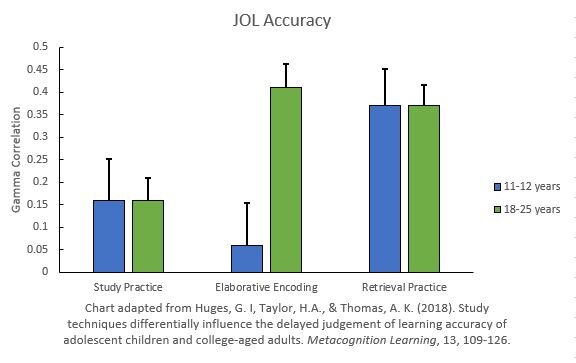Siirry offline-tilaan Player FM avulla!
Episode 50 - Metacognitive Monitoring of Adolescents and Young Adults
Manage episode 272275494 series 1711756
This episode was funded by listeners like you. For more details on how to help support our podcast and gain access to exclusive content, please see our Patreon page.
Show Notes:
In today’s episode, Althea covers a paper about metacognitive monitoring and differences between adolescents (ages 11-12) and traditional university-aged adults (ages 18-25) when using different learning strategies.
Students learned word pairs (moon - galaxy). Then, they either just restudied them, engaged in elaborative encoding by coming up with a third word that connected the two words (like space), or practiced retrieval (given the word moon, and asked to retrieve galaxy). During learning, the students made judgments of learning (or JOLs) about how well they thought they would do on an upcoming test. The researchers tested the students’ memories to see how well they learned the pairs.

The pattern of performance on the final test was generally the same. Retrieval practice led to the best performance, followed by elaborative encoding, and then the worst performance was restudying.
However, this isn’t new. The researchers are most interested in how well the students were able to monitor their own learning and predict how well they had learned the pairs. For the adolescents, their ability to judge how well they would do on a later test was not very accurate when they restudied or engaged in elaborative encoding. Their relative accuracy at judging how well they would perform was better for retrieval practice. So, the strategy that worked best also produced the best relative accuracy at predicting
The young adults showed the same relative accuracy as the adolescents in the restudy and the retrieval conditions. Their ability to predict was very poor after restudying and was better after retrieval practice. Interestingly, the young adults had the best relative accuracy after elaborative encoding, meaning that this was the condition where they were best able to predict how well they would perform on the test later.
When young adults in College (University) are utilizing a strategy that helps them learn more, like elaborative encoding or retrieval practice, they are better able to predict their own learning. However, this was not always true for adolescents in middle school. When using elaborative encoding, a strategy that helped them compared to just restudying, their predictions were not very accurate at all.
References:
Hughes, G. I, Taylor, H. A., & Thomas, A. K. (2018). Study techniques differentially influence the delayed judgment of learning accuracy of adolescent children and college-aged adults. Metacognition Learning, 13, 109-126.
81 jaksoa
Manage episode 272275494 series 1711756
This episode was funded by listeners like you. For more details on how to help support our podcast and gain access to exclusive content, please see our Patreon page.
Show Notes:
In today’s episode, Althea covers a paper about metacognitive monitoring and differences between adolescents (ages 11-12) and traditional university-aged adults (ages 18-25) when using different learning strategies.
Students learned word pairs (moon - galaxy). Then, they either just restudied them, engaged in elaborative encoding by coming up with a third word that connected the two words (like space), or practiced retrieval (given the word moon, and asked to retrieve galaxy). During learning, the students made judgments of learning (or JOLs) about how well they thought they would do on an upcoming test. The researchers tested the students’ memories to see how well they learned the pairs.

The pattern of performance on the final test was generally the same. Retrieval practice led to the best performance, followed by elaborative encoding, and then the worst performance was restudying.
However, this isn’t new. The researchers are most interested in how well the students were able to monitor their own learning and predict how well they had learned the pairs. For the adolescents, their ability to judge how well they would do on a later test was not very accurate when they restudied or engaged in elaborative encoding. Their relative accuracy at judging how well they would perform was better for retrieval practice. So, the strategy that worked best also produced the best relative accuracy at predicting
The young adults showed the same relative accuracy as the adolescents in the restudy and the retrieval conditions. Their ability to predict was very poor after restudying and was better after retrieval practice. Interestingly, the young adults had the best relative accuracy after elaborative encoding, meaning that this was the condition where they were best able to predict how well they would perform on the test later.
When young adults in College (University) are utilizing a strategy that helps them learn more, like elaborative encoding or retrieval practice, they are better able to predict their own learning. However, this was not always true for adolescents in middle school. When using elaborative encoding, a strategy that helped them compared to just restudying, their predictions were not very accurate at all.
References:
Hughes, G. I, Taylor, H. A., & Thomas, A. K. (2018). Study techniques differentially influence the delayed judgment of learning accuracy of adolescent children and college-aged adults. Metacognition Learning, 13, 109-126.
81 jaksoa
Kaikki jaksot
×Tervetuloa Player FM:n!
Player FM skannaa verkkoa löytääkseen korkealaatuisia podcasteja, joista voit nauttia juuri nyt. Se on paras podcast-sovellus ja toimii Androidilla, iPhonela, ja verkossa. Rekisteröidy sykronoidaksesi tilaukset laitteiden välillä.




